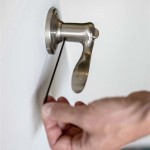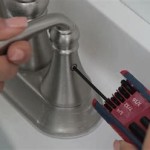How To Clean Bathroom Tiles With Hard Water Stains
Hard water stains can mar the appearance of otherwise pristine bathroom tiles. These unsightly deposits, largely composed of calcium and magnesium minerals, build up over time, leaving behind a chalky, cloudy film or even crusty, discolored patches. Effectively removing these stains requires understanding the nature of the deposits and employing appropriate cleaning methods.
Understanding Hard Water Stains
Hard water stains vary in appearance depending on the mineral content of the water and the duration of the buildup. They can manifest as:
- Thin, white film: This is the most common type and often appears on shower doors, tiles, and faucets.
- Cloudy residue: This gives surfaces a dull, hazy appearance.
- Brown or rust-colored stains: These occur when iron is present in the water.
- Crusty, scaly deposits: These are more difficult to remove and indicate a significant buildup.
Essential Cleaning Supplies
Gathering the right cleaning supplies is crucial for effective hard water stain removal. The necessary items include:
- White vinegar: A natural, effective cleaning agent for dissolving mineral deposits.
- Baking soda: A mild abrasive that helps to scrub away stains.
- Lemon juice: Another natural acid that can break down mineral deposits.
- Spray bottle: Useful for applying cleaning solutions evenly.
- Microfiber cloths: Soft and absorbent, they are ideal for cleaning and polishing.
- Scrub brush: Choose a brush with soft to medium bristles to avoid scratching tiles.
- Squeegee: Essential for preventing water spots and future buildup on shower doors and tiles.
- Commercial hard water stain remover: For stubborn stains, a commercial cleaner specifically designed for hard water may be necessary. Follow product instructions carefully.
- Rubber gloves: Protect hands from harsh cleaning agents.
Cleaning Methods for Light to Moderate Stains
For less severe hard water stains, the following methods often prove successful:
- Vinegar Spray: Fill a spray bottle with undiluted white vinegar. Spray the affected area generously and let it sit for 15-20 minutes. Scrub with a soft brush and rinse thoroughly with water.
- Baking Soda Paste: Make a paste of baking soda and water. Apply the paste to the stained areas and let it sit for 10-15 minutes. Gently scrub with a soft brush or cloth and rinse clean.
- Lemon Juice Application: Apply fresh lemon juice directly to the stains. Let it sit for 15-20 minutes, then scrub and rinse.
Tackling Stubborn Hard Water Stains
Heavier hard water deposits may require more intensive cleaning methods:
- Vinegar and Baking Soda Combination: Spray the affected area with vinegar. While the vinegar is still wet, sprinkle baking soda over the surface. The combination will create a fizzing action that helps loosen the mineral deposits. Let it sit for 15-20 minutes, then scrub and rinse.
- Commercial Hard Water Stain Remover: For particularly stubborn stains, a commercial cleaner may be necessary. Follow the manufacturer's instructions carefully, as some products may contain harsh chemicals. Ensure adequate ventilation.
- Paste of Borax and Vinegar: Combine borax and vinegar to create a paste. Apply to the stains, let it sit for 30-45 minutes, scrub, and rinse.
Preventing Hard Water Stains
Preventing future hard water stains is much easier than removing existing buildup. Implementing these preventative measures can save time and effort:
- Regular Cleaning: Regularly wiping down shower walls and doors after each use with a squeegee or microfiber cloth can significantly reduce buildup.
- Ventilation: Proper ventilation helps reduce moisture and prevents water spots from forming.
- Water Softener: Installing a water softener can address the root cause of hard water stains by removing minerals from the water supply.
Maintaining Clean Bathroom Tiles
Maintaining clean bathroom tiles requires consistent effort. Following these practices will help keep tiles sparkling:
- Weekly Cleaning: Clean tiles with a mild cleaning solution once a week to prevent buildup.
- Rinse After Each Use: Rinsing away soap and shampoo residue prevents the formation of soap scum which can trap minerals and contribute to hard water stain formation.
- Dry Surfaces: Thoroughly drying surfaces after cleaning further reduces the opportunity for mineral deposits to form.
Choosing the Right Cleaning Method
The optimal cleaning method depends on the severity of the stains and the type of tile. Always test any cleaning solution on a small, inconspicuous area first to ensure it doesn't damage the tile surface.
- Consider Tile Type: Porous tiles such as natural stone may require specialized cleaners. Avoid acidic cleaners on these surfaces.
- Severity of Stains: Light stains may respond to milder cleaning solutions like vinegar or baking soda, while heavier stains may require commercial cleaners or more intensive methods.
- Test Before Applying: Before applying any cleaning solution, test it on a small, hidden area to ensure it doesn't damage the tile or grout.
Maintaining clean bathroom tiles requires diligence and appropriate cleaning practices. By understanding the nature of hard water stains and employing effective cleaning strategies, one can restore the shine and beauty of bathroom surfaces and prevent future buildup.

3 Best Ways To Get Rid Of Hard Water Stains From Bathroom Tiles Kent

How To Remove Hard Water Stain From Tile And Grout

How To Remove Hard Water Stains From Tile And Grout Woodard

How To Remove Stains From Bathroom Tiles

How To Clean Hard Water Stains From Bathroom Tiles

3 Best Ways To Get Rid Of Hard Water Stains From Bathroom Tiles Kent

How To Remove Hard Water Stains On Bathroom Tiles Best Ways Clean Spots

Home Dzine Bathrooms Remove Hard Water Stains And Mould

How To Remove Stains From Bathroom Tiles

3 Best Ways To Get Rid Of Hard Water Stains From Bathroom Tiles Kent
Related Posts







